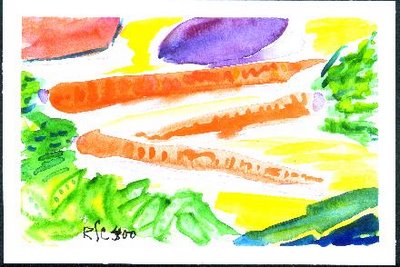
American Life in Poetry: Column 053
BY TED KOOSER, U.S. POET LAUREATEWriting poetry, reading poetry, we are invited to join with others in celebrating life, even the ordinary, daily pleasures. Here the Seattle poet and physician, Peter Pereira, offer us a simple meal.A Pot of Red Lentilssimmers on the kitchen stove.
All afternoon dense kernels
surrender to the fertile
juices, their tender bellies
swelling with delight.
In the yard we plant
rhubarb, cauliflower, and artichokes,
cupping wet earth over tubers,
our labor the germ
of later sustenance and renewal.
Across the field the sound of a baby crying
as we carry in the last carrots,
whorls of butter lettuce,
a basket of red potatoes.
I want to remember us this way--
late September sun streaming through
the window, bread loaves and golden
bunches of grapes on the table,
spoonfuls of hot soup rising
to our lips, filling us
with what endures.
Reprinted from "Saying the World," 2003, by permission of Copper Canyon Press. Copyright (c) 2003 by Peter Pereira. This weekly column is supported by The Poetry Foundation, The Library of Congress, and the Department of English at the University of Nebraska-Lincoln. This column does not accept unsolicited poetry. ******************************









